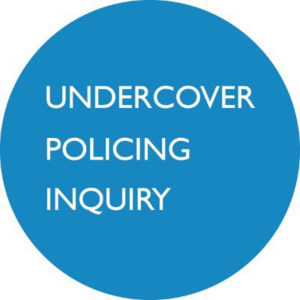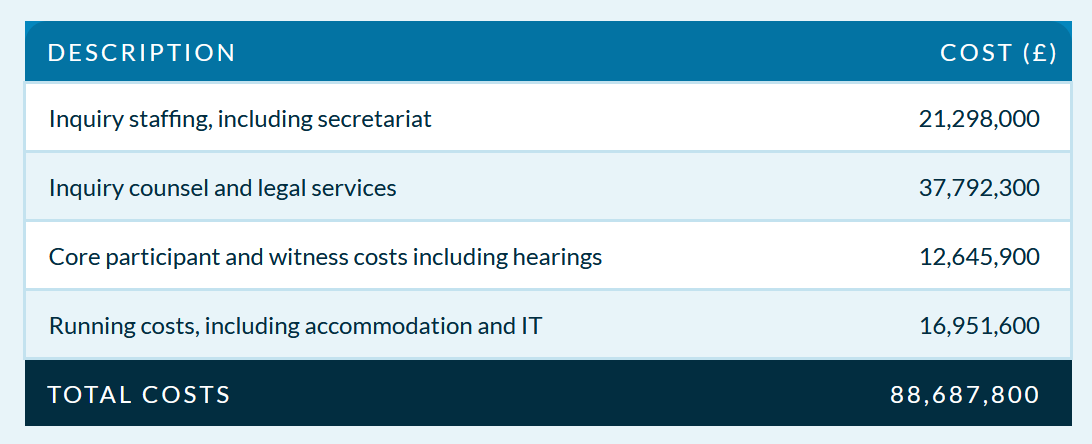UCPI FAQ: The Spycops Public Inquiry

What is the Undercover Policing Inquiry?
The Undercover Policing Inquiry (UCPI) is an independent, judge-led inquiry into undercover policing in England and Wales.
Its main focus is the activity of two undercover units who deployed long-term undercover officers into a variety of political groups: the Special Demonstration Squad (1968-2008) and the National Public Order Intelligence Unit (1999-2011).
Officers from these units lived as activists for years at a time. More than 1,000 groups were spied on, though the Inquiry has named less than 100. Activist researchers have produced a more complete list of those targeted.
Beyond collecting information personal details about people’s lives, officers often:
- stole the identities of dead children
- took key roles in the organisations they infiltrated
- encouraged and participated in illegal activity
- formed emotional relationships with children of people they spied on
- supplied personal information for illegal blacklists of politically active workers
- orchestrated wrongful convictions of activists
- deceived women they spied on into long-term intimate relationships
After its first round of hearings, the Inquiry issued an interim report in 2023 that was utterly damning. It declared there was no justification for that these officers did and, had the public been aware, they would have been swiftly shut down.
When was the Undercover Policing Inquiry set up?
On 6 March 2014, after more than three years of escalating revelations, the Home Secretary announced in Parliament that there would be a full-scale public inquiry under the terms of the Inquiries Act 2005.
The process began on 28 July 2015, with opening remarks on the purpose, remit and intent from the Chair, Lord Pitchford.
Following Lord Pitchford’s death in October 2017, Sir John Mitting was appointed as Chair. Despite the serious reservations of victims, he remained in the post. In June 2025 he announced his intention to retire after Tranche 3 of the Inquiry, expected to be after he published an interim report on the SDs in the second half of 2027.
Who is giving evidence at the Undercover Policing Inquiry?
The witnesses will include officers and people that they spied on. The Inquiry will publish a draft list of witnesses giving evidence at least four weeks before the hearing.
We don’t get to see the files that are going to be cited and discussed in the hearings until the day they are mentioned, and the Inquiry has been slapdash about it – many are not published until months after the hearings in which they’re mentioned.
How does the Undercover Policing Inquiry take evidence from witnesses?
The Inquiry tries to avoid being an adversarial format with witnesses feeling cross-examined by hostile lawyers. Instead, all the lawyers involved – representing police, victims and the inquiry itself – hand in questions the would like a witness to answer.
A witness is then questioned by one neutral lawyer, the Counsel to the Inquiry. At the end of questioning, there is a short break while Counsel checks with the various lawyers if they feel anything has been missed or needs answering in more detail.
How does the Undercover Policing Inquiry organise its investigation?
The Inquiry’s investigations are broken into three modules:
Module 1: Examination of the deployment of undercover officers in the past, their conduct, and the impact of their activities on themselves and others.
Module 2: Examination of the management and oversight of undercover officers, including their selection, training, supervision, care after deployments, and the legal and regulatory framework within which undercover policing was carried out.
- Module 2a will involve managers and administrators from within undercover policing units.
- Module 2b will involve senior managers higher in the chain of command as well as police personnel who handled intelligence provided by undercover police officers.
- Module 2c will involve other government bodies with a connection to undercover policing, including the Home Office.
Module 3: Examination of current undercover policing practices and of how undercover policing should be conducted in future.
Module 1 has been broken down into six ‘tranches’.
Tranche 1 hearings will be taking evidence about the activities of the Special Demonstration Squad (SDS) from its formation in 1968 to 1982.
Tranche 1 has, in turn, been broken into three phases:
Phase 1 examined the SDS from 1968 to 1972.
Phase 2 examined the SDS from 1973 to 1982.
Phase 3 examined SDS managers 1968-1982.
Tranche 2 examined Special Demonstration Squad officers and managers and those affected by deployments (1983-1992). This was split into two phases – Phase 2 covered animal rights-related campaigns, Phase 1 examined everything else.
The subsequent tranches will examine:
- Tranche 3 – Special Demonstration Squad officers and managers and those affected by deployments (1993-2008)
- Tranche 4 – National Public Order Intelligence Unit officers and managers and those affected by deployments
- Tranche 5 – Other undercover policing officers and managers and those affected by deployments
- Tranche 6 – Management and oversight (including of intelligence dissemination) by mid and senior rank officers, other agencies and government departments
What are the dates for the Undercover Policing Inquiry?
The first hearings of Tranche 1 took place between 2 and 19 November 2020.
Tranche 1 (Special Demonstration Squad 1968-82):
Phase 1, 1968-72. These hearings took place in November 2020.
Phase 2, 1973-82. These hearings took place in April and May 2021.
Phase 3, managers 1968-1982. These hearings took place in May 2022.
Tranche 2 (SDS 1983-1992):
Phase 1 (non-animal rights) hearings took place in July and August 2024.
Phase 2 (animal rights) hearings began on 14 October 2024, and ran to March 2025.
Tranche 3 (SDS 1993-2007) hearings will also take place in phases:
Tranche 3 Phase 1 hearings, SDS officers and relevant civilians 1993-2008 part 1, will be held 13 October 2025–approx 18 December 2025.
Tranche 3 Phase 2 hearings, SDS officers and relevant civilians 1993-2008 part 2, will be held 2 February 2026-approx 26 March 2026.
Tranche 3 Phase 3 hearings, SDS managers, will be held 15 June 2026-approx 30 July 2026.
Tranche 4 (NPOIU) hearings have no dates set as yet. They’re expected to be in the latter part of 2027.
Tranche 5 (Other undercover policing and those affected by deployments) hearings have no dates set as yet.
Tranche 6 (higher management and oversight) is being done as the other tranches occur.
There is no set completion date for the Inquiry’s final report, but 2029 seems as good a guess as any.
Why are there such large gaps between hearings at the Undercover Policing Inquiry?
The Inquiry is handling hundreds of thousands of vintage files, collated from police, Security Service and other sources. It takes a long time to analyse these formulate lines of enquiry, and decide which people to call as witnesses. The witnesses then have to have the documents to be discussed. Everyone’s lawyers have to feed into the process of producing questions for witnesses.
Then, after the hearings, the evidence gathered has to be analysed and considered so the Inquiry can draw conclusions in their own right, as well as contributing to the approach of the next round of hearings.
How much will the Undercover Policing Inquiry cost?
Up to the end of June 2024, the Inquiry had already cost £88,687,800. This will increase substantially as time goes on.

How long will the Undercover Policing Inquiry last?
The Inquiry was originally expected to publish its final report in summer 2018.
After a huge amount of deliberate delay from the police, the schedule was drastically revised. In May 2018, the Inquiry announced an ‘ambitious’ timeline that planned to deliver the final report to the Home Secretary in late 2023. A redacted version would have been expected to be published some time in 2024.
The Inquiry had already fallen a year behind this schedule before the Covid-19 pandemic. That postponed the initial hearings by five months. Additional delays set it back further, putting it years behind the ‘ambitious timeline’ of 2024.
When we’ll see the final report is anyone’s guess, but 2029 seems plausible.
Where are the Undercover Policing Inquiry hearings held?
Preliminary hearings were held at the Royal Courts of Justice.
Hearings for Tranche 1, phases 1 and 2 were held virtually, with a viewing room at the Amba Hotel Marble Arch in London. Phase 3’s the opening statements were given virtually, and the evidence hearings were held in person at the Amba Hotel Marble Arch.
Tranche 2 hearings took place at the International Dispute Resolution Centre (IDRC), 1 Paternoster Lane, London, EC4M 7BQ.
Are the Undercover Policing Inquiry hearings live streamed?
Access to the hearings has varied. Generall, opening statments have been directly live streamed. After that, witness evidence has been live on the Inquiry’s YouTube channel with a ten minute delay so the Inquiry will be able to prevent any unintentionally revealed sensitive information from being published.
A transcript of each day’s hearing is usually published on the Inquiry’s website in the evening in weirdly formatted PDFs that are not that easy to read.
For four weeks in autumn 2024, the Inquiry stopped any livestreaming. It promised to upload edited videos 3-5 days after hearings, but did not actually do so.
Where can I find out what’s going on?
We will be live tweeting on the COPS Twitter account, and publishing daily reports and weekly summaries on our blog. We also have Facebook, Bluesky, Mastodon, Threads, and an email list (which you can join at the bottom of the sidebar on this page). Tom Fowler, an activist who was spied on by undercover officer Marco Jacobs, usually does excellent opinionated live-tweeting too.
We also expect coverage from our friends at Police Spies Out of Lives (who represent women deceived into relationships by spycops) and the Undercover Research Group, with incisive comment and analysis.
In the mainstream media, Rob Evans and Paul Lewis at the Guardian, who have covered the scandal since it began and co-wrote the Undercover book, are highly likely to be doing quality reporting too.

3 comments on “UCPI FAQ: The Spycops Public Inquiry”